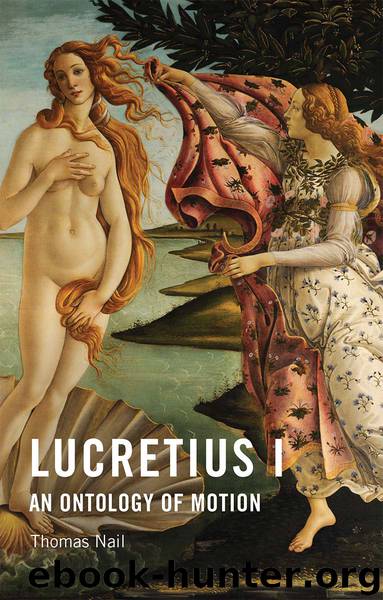Lucretius I by Thomas Nail

Author:Thomas Nail
Language: eng
Format: epub
Publisher: Edinburgh University Press
9. The Infinity of Matter
If nature is nothing but flows and folds of matter in motion, it follows that it must be infinite. This is the radical thesis put forward by Lucretius in the final lines of Book I. He makes this argument following four distinct theses on infinity: 1) all of nature is infinite; 2) space is infinite; 3) matter is infinite; and 4) the universe has no centre or origin. Put synthetically, each thesis forms a part of the following single definition of infinity: Nature is infinite because space and material flows alternate infinitely without beginning or end.
In order to further demonstrate the primacy of motion in Lucretius’ poem, this chapter examines each of these theses and compares them in turn with some of the most recent findings in contemporary physics and cosmology. Although written almost two thousand years ago, Lucretius’ ontological and cosmological theses remain surprisingly contemporary, cutting edge, and generally consistent with today’s understanding of these matters.
First Thesis: Nature is Infinite
Lucretius’ first thesis of infinity is that nature is infinite. This is the case not because nature is an infinite totality or unity, but because nature is an open infinity in all directions without final limit (1.960–4).
extremum porro nullius posse videtur
esse, nisi ultra sit quod finiat, ut videatur
quo non longius haec sensus natura sequatur.
nunc extra summam quoniam nihil esse fatendum,
non habet extremum, caret ergo fine modoque.
And, moreover, it seems that there cannot be an end point for anything,
unless there is something beyond it which limits it, so that there is seen
to be a place beyond which this nature of our senses cannot follow.
Now since it must be confessed that there is nothing outside the universe,
it does not have an endpoint, and therefore lacks boundary and limit.
This thesis is possible because of the paradox of the limit. The limit is produced by active processes of limiting or bordering which, in the very act of demarcation, produce an extension beyond the limit. Every limit thus presupposes a division on either side. On one side of the limit, for example, things are included, on the other they are excluded. Each limitation therefore presupposes both that which is limited and that which it is limited by. If things were only limited but not limited by anything else they would not be limited. Therefore, all limitation presupposes that which does the limiting. However, that which does the limiting is itself not contained in the limits, which it produces. If it were, it would be no different than that which is limited and thus there would be no limit. Therefore, since every limit presupposes that which is limited and that which it is limited by, nature cannot, by definition of limitation, be a totality, a unity, or ‘one’.
The second part of this paradox is that our senses can never follow [sequatur] (1.962) beyond the limit. Although any given limitation can be overcome by yet another larger limitation, it is only the process of limitation itself, in the form of the fold of the corporeal flows, that provides the conditions of sensation, as was shown in Chapter 1.
Download
This site does not store any files on its server. We only index and link to content provided by other sites. Please contact the content providers to delete copyright contents if any and email us, we'll remove relevant links or contents immediately.
The remains of the day by Kazuo Ishiguro(8962)
Tools of Titans by Timothy Ferriss(8359)
Giovanni's Room by James Baldwin(7313)
The Black Swan by Nassim Nicholas Taleb(7097)
Inner Engineering: A Yogi's Guide to Joy by Sadhguru(6783)
The Way of Zen by Alan W. Watts(6589)
Asking the Right Questions: A Guide to Critical Thinking by M. Neil Browne & Stuart M. Keeley(5751)
The Power of Now: A Guide to Spiritual Enlightenment by Eckhart Tolle(5741)
The Six Wives Of Henry VIII (WOMEN IN HISTORY) by Fraser Antonia(5493)
Astrophysics for People in a Hurry by Neil DeGrasse Tyson(5172)
Housekeeping by Marilynne Robinson(4433)
12 Rules for Life by Jordan B. Peterson(4298)
Double Down (Diary of a Wimpy Kid Book 11) by Jeff Kinney(4257)
The Ethical Slut by Janet W. Hardy(4236)
Skin in the Game by Nassim Nicholas Taleb(4232)
Ikigai by Héctor García & Francesc Miralles(4229)
The Art of Happiness by The Dalai Lama(4118)
Skin in the Game: Hidden Asymmetries in Daily Life by Nassim Nicholas Taleb(3986)
Walking by Henry David Thoreau(3949)
